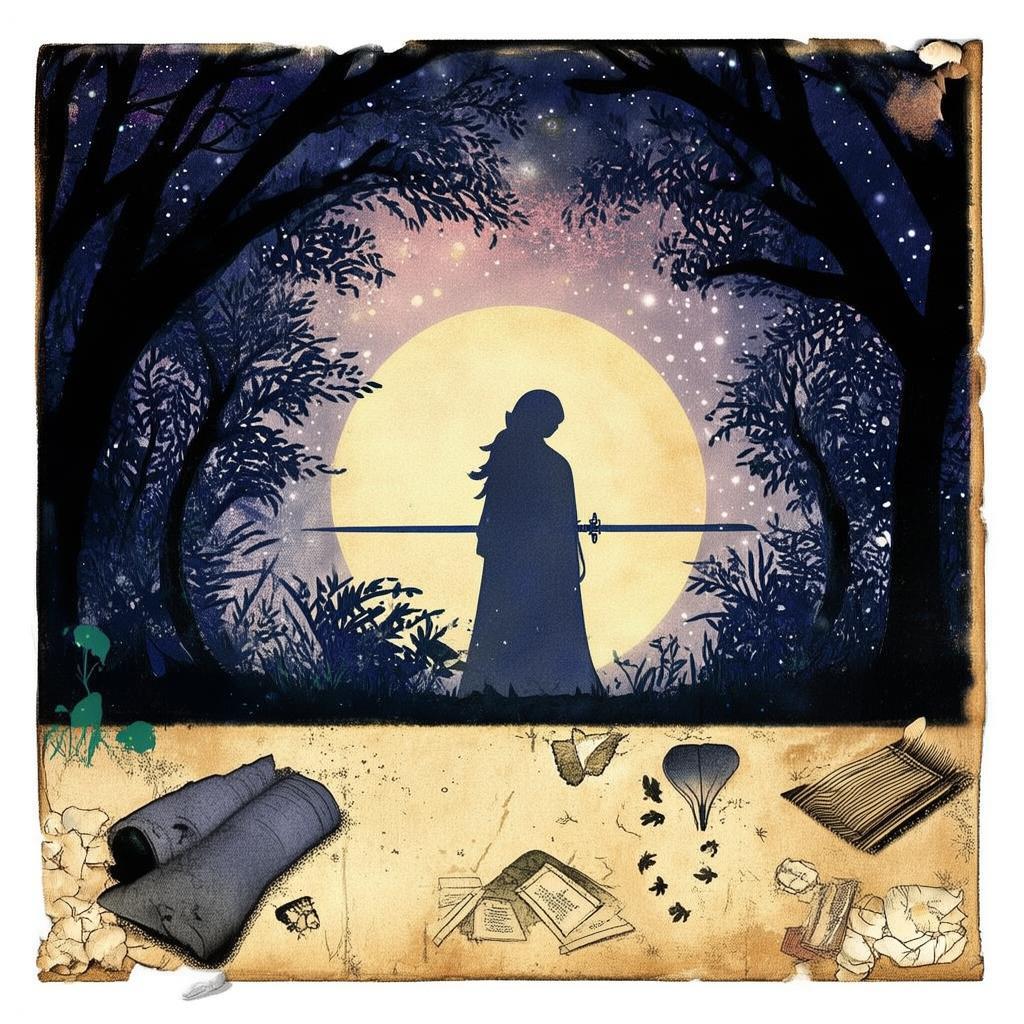Chorus of Defiance: The Echoes of Two Empires
The night sky above the city of Aetherea was a tapestry of stars, each one a silent witness to the whispered symphony that played in the minds of its inhabitants. The Grand Symphony of Defiance, as it was known, was a collection of melodies, harmonies, and counterpoints that resonated through the hearts of the rebels who sought to end the reign of the two empires that had long held their world captive.
In the shadow of the towering spires of the Northern Empire, a figure moved with the grace of a shadow. His name was Kael, a man whose eyes held the fire of defiance. He was a defector, once a loyalist of the Northern Empire, but now a voice of rebellion, his heart and soul forever altered by the whispers of the Grand Symphony.
Kael's path was one of constant danger. The empire's spies were everywhere, and his every move was watched. Yet, he carried a secret that could change everything. A secret that was bound to the very fabric of the Grand Symphony itself.
The Grand Symphony was not just a collection of melodies; it was a beacon, a guiding light for those who sought to rise against the yoke of oppression. It was a symphony of defiance, a testament to the resilience of the human spirit, and a call to arms for those who dared to dream of a world free from the chains of tyranny.
As Kael wandered through the dark alleys of Aetherea, his thoughts were consumed by the music that had become his constant companion. The notes of the symphony seemed to guide him, urging him toward a rendezvous with a mysterious figure known only as the Maestro.
The Maestro was a legend, a figure whose name was whispered in hushed tones. He was the architect of the Grand Symphony, the one who had orchestrated the rebellion's rise from the ashes of despair. Kael had heard the tales, the stories of the Maestro's genius, his unyielding determination, and his unwavering belief in the power of music to inspire change.
As Kael approached the meeting point, he felt a surge of anticipation. The Maestro was not just a man; he was a symbol of hope, a lighthouse in the storm of tyranny.
The meeting was brief but intense. The Maestro, a man of few words, handed Kael a set of sheets of parchment. They were the latest compositions of the Grand Symphony, the newest movements that would soon echo through the streets of Aetherea, stirring the hearts of the oppressed.
Kael knew that these sheets were no ordinary piece of paper. They were a call to action, a call to rebellion. And as he tucked them into his cloak, he felt the weight of responsibility settle upon his shoulders.
Back in his hideout, Kael began to study the compositions. The Maestro's hand was evident in every note, every rhythm. The music was not just beautiful; it was powerful, a force that could break the chains of fear and inspire the people to rise up against their oppressors.
As the night wore on, Kael's fingers danced across the keys of an old, out-of-tune piano, bringing to life the melodies that would soon stir the city. Each note was a whisper, a promise of freedom, a reminder that the Grand Symphony was more than just music; it was a beacon of hope.
In the days that followed, Kael became the voice of the Grand Symphony. He traveled through the city, performing in hidden venues, in basements, and in the quiet corners of the night. His performances were not just concerts; they were acts of defiance, a rebellion against the silence that had been imposed upon the people.
Word of Kael's performances spread like wildfire. The Grand Symphony was no longer just a whisper; it was a roar, a testament to the power of music to unite and inspire.
But the empire did not take kindly to the growing rebellion. Spies were sent to silence Kael, to quash the Grand Symphony before it could reach its full potential. Yet, each attempt to silence the rebellion only seemed to amplify its voice, as more and more people joined the cause, their hearts stirred by the music that had become their anthem.
Kael's fate was tied to the Grand Symphony, and as the empire's grip on the city tightened, so too did his resolve. He knew that the path he had chosen was one of peril, but he also knew that it was the only path that led to freedom.
One night, as Kael performed in a dimly lit tavern, the sound of footsteps echoed through the room. The tavern's patrons turned to see a group of empire soldiers, their faces cold and menacing.
Kael's heart raced, but his eyes remained steady. He had faced the empire before, and he knew that his fate was intertwined with the Grand Symphony. As the soldiers moved toward him, Kael reached into his cloak and pulled out a small, ornate box.
The box contained a single sheet of parchment, the final movement of the Grand Symphony. It was a piece that would not only bring the symphony to its climax but would also reveal the true nature of the empire's power.
Kael's fingers traced the delicate script on the parchment as he began to play. The music was haunting, beautiful, and filled with a sense of impending doom. The tavern's patrons were captivated, their eyes wide with fear and wonder as the music swelled around them.

The soldiers stood frozen, their eyes fixed on Kael as the music reached its peak. The final note echoed through the room, a powerful, resonant sound that seemed to shake the very foundations of the empire.
As the music faded, the soldiers remained motionless. Kael knew that the Grand Symphony had done its work. It had shown the empire that the people were not to be silenced, that their voices, their music, were a force that could not be contained.
Kael walked out of the tavern, the music still resonating in his heart. The Grand Symphony had won, not just on that night, but in the hearts and minds of the people. And as Kael continued his journey, he knew that the symphony of defiance would continue to echo, forever changing the world.
In the end, Kael's story was one of music, of defiance, and of the indomitable spirit of the human heart. His journey had been long and fraught with danger, but his love for the Grand Symphony had been unwavering. And as the echoes of the symphony continued to resonate through the empires, it became clear that the true power lay not in the hands of the rulers, but in the hearts of those who dared to dream of a better world.
✨ Original Statement ✨
All articles published on this website (including but not limited to text, images, videos, and other content) are original or authorized for reposting and are protected by relevant laws. Without the explicit written permission of this website, no individual or organization may copy, modify, repost, or use the content for commercial purposes.
If you need to quote or cooperate, please contact this site for authorization. We reserve the right to pursue legal responsibility for any unauthorized use.
Hereby declared.









